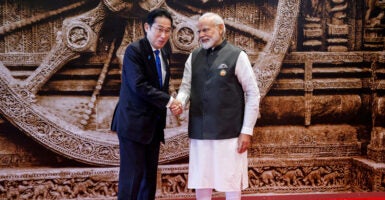At a recent campaign event, President Joe Biden described key U.S. ally Japan and partner India as “xenophobic” nations and equated them to Russia and China.
Biden appeared to make the comment off the cuff at a fundraising event, at which he claimed that the American economy was thriving and that that was due to immigration. The president said:
Why? Because we welcome immigrants. Look, think about it. Why is China stalling so badly economically? Why is Japan having trouble? Why is Russia? Why is India? Because they’re xenophobic. They don’t want immigrants.
Days later, both Japan and India rejected Biden’s description of them as “xenophobic.”
A Japanese government official, who declined to be identified due to the sensitivity of the issue, said that Biden’s statements were unfortunate and not based on an accurate understanding of Japanese policies.
Indian External Affairs Minister S. Jaishankar rebutted the comment and defended India as a democracy:
I haven’t seen such an open, pluralistic, and diverse society anywhere in the world. We are actually not just not xenophobic, we are the most open, most pluralistic, and in many ways, the most understanding society in the world.
Jaishankar is right, and Biden is wrong.
What’s more, Japan and India enjoy two of the largest economies and defense budgets on the planet, integral to any U.S. plan to deter Chinese aggression in the Indo-Pacific.
In April, Biden and Japanese Prime Minister Fumio Kishida issued a joint statement and celebrated a new era of U.S.-Japan strategic cooperation and pledged the continuation of “tireless work, together, and with our partners, to realize a free and open Indo-Pacific and world.”
Forged after World War II, the U.S.-Japanese alliance was created as the cornerstone of U.S. security interests in Asia. Based on shared interests and values, the U.S. and Japan have worked closely with each other as allies for more than six decades.
Japan remains a valuable member of the “Quad,” a multilateral grouping comprising the U.S., Australia, India, and Japan. The four partners have expressed shared interests and shared concerns in the Indo-Pacific, as China has grown increasingly aggressive in the region.
Just last year, Biden and Indian Prime Minister Narendra Modi issued a joint statement declaring the U.S. and India as “among the closest partners in the world” through the U.S.-India Comprehensive Global and Strategic Partnership and the Quad.
The partnership is driven by shared democratic values and convergence of strategic interests, with both sides committed to building a “free, open, inclusive, and resilient Indo-Pacific.”
Supporters of Biden—in the media and elsewhere—have repeatedly criticized former President Donald Trump for having been critical of U.S. allies in Europe. In his first foreign policy address, Biden promised to repair America’s alliances from the poor shape he and his administration claimed they were in under the Trump administration, insisting that “diplomacy is back.”
If denigrating U.S. allies and partners with ludicrous allegations counts as a return of “diplomacy,” we were better off without it.































